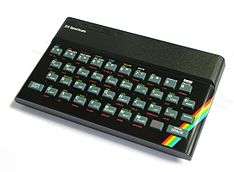TK95
| Type | Home computer |
|---|---|
| Release date | 1986 |
| Operating system | Sinclair BASIC |
| CPU | Zilog Z80B @ 3.5 MHz |
| Memory | 48KB RAM) |
The TK95 microcomputer was the evolution of TK90X made in the 1980s by Microdigital Eletronica, a company located at São Paulo, Brazil that manufactured some ZX81 clones before (TK82, TK82C, TK83 and TK85) and a ZX80 clone (TK80). The first version was launched in November 1986.
The case suffered a redesign (copied from the Commodore Plus/4[1]) and the keyboard was said to be "semi-professional" (according to the Brazilian manufacturer), with the some additional commands that did not exist in the ZX Spectrums (for characters defined by the user — UDG), and more compatibility with the original ZX Spectrum (some games did not run in TK90X but ran alright in the TK95).
There was one version with 48 kilobytes of RAM. Inside, the same processor: Z80A running at 3.58 MHz, a ROM chip, some RAM chips (old dynamic rams 4116 and 4416). Microdigital did some reverse engineering to develop a chip with the functions of the original ULA from Sinclair/Ferranti. The modulator was tuned to VHF channel 3 and the TV system was PAL-M (60 Hz). The cassette interface ran at a faster speed than the Spectrum. Only two peripherals were released by Microdigital — a light pen interface and a parallel printer interface. Some other small companies in Brazil released clone versions of interface 1, joysticks (Atari 2600-compatibles) and interfaces for 5 ¼" PC drives (360 KiB). The games had questionable legality being close to copies of the originals and the fans of the ZX Spectrum computer in Brazil were counted in tens of thousands.
References
- ↑ "Microdigital TK90x" (in French). Archived from the original on November 25, 2006. Retrieved 2013-03-14.
notre constructeur brésilien va faire un effort et sortira dans la foulée le TK95 à l'allure d'un Commodore Plus/4.
External links
- (Portuguese)-Clube do TK90X
- TK95 in Old-Computers
- ZEsarUX - ZX Second-Emulator And Released for UniX (GPL)
